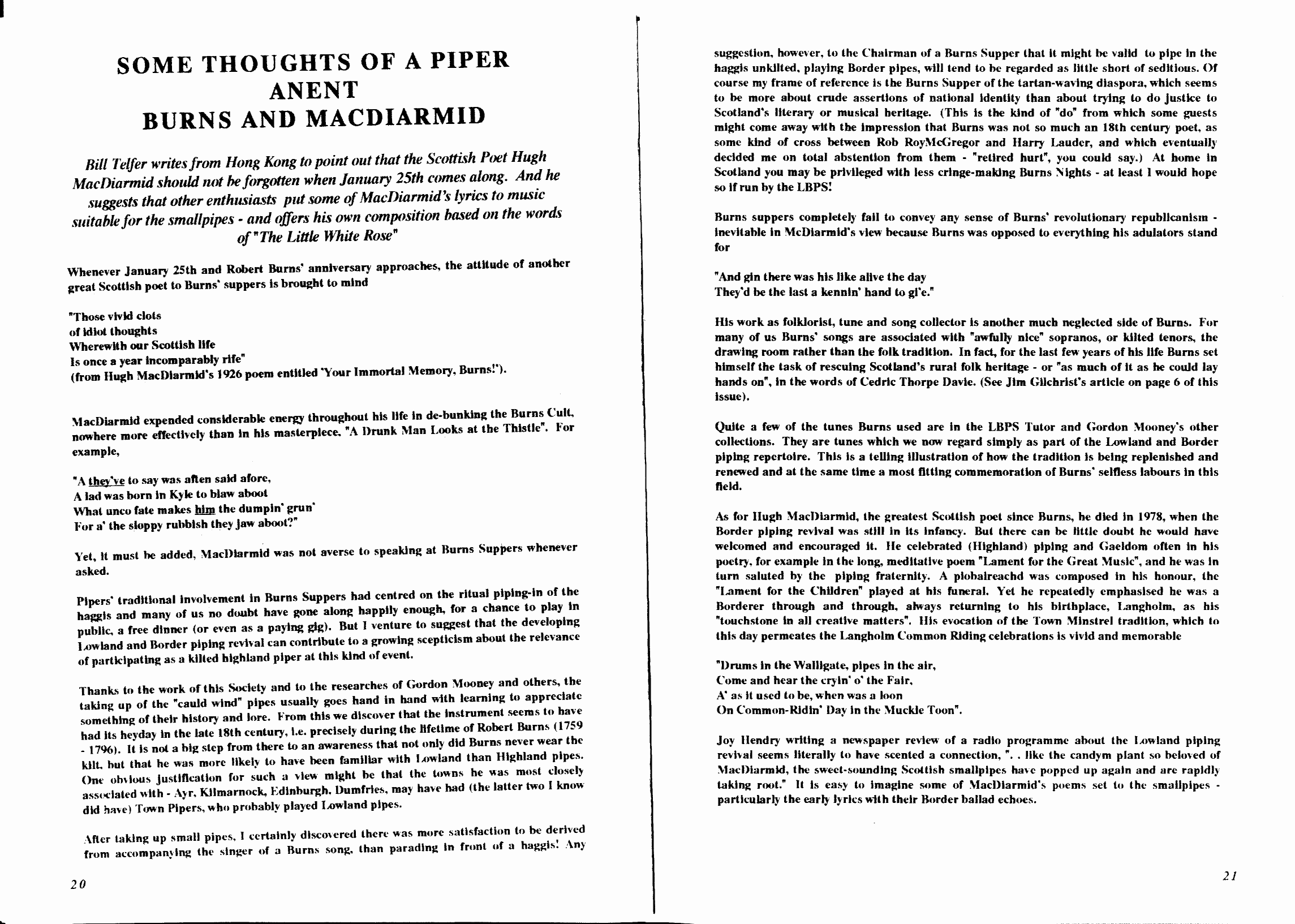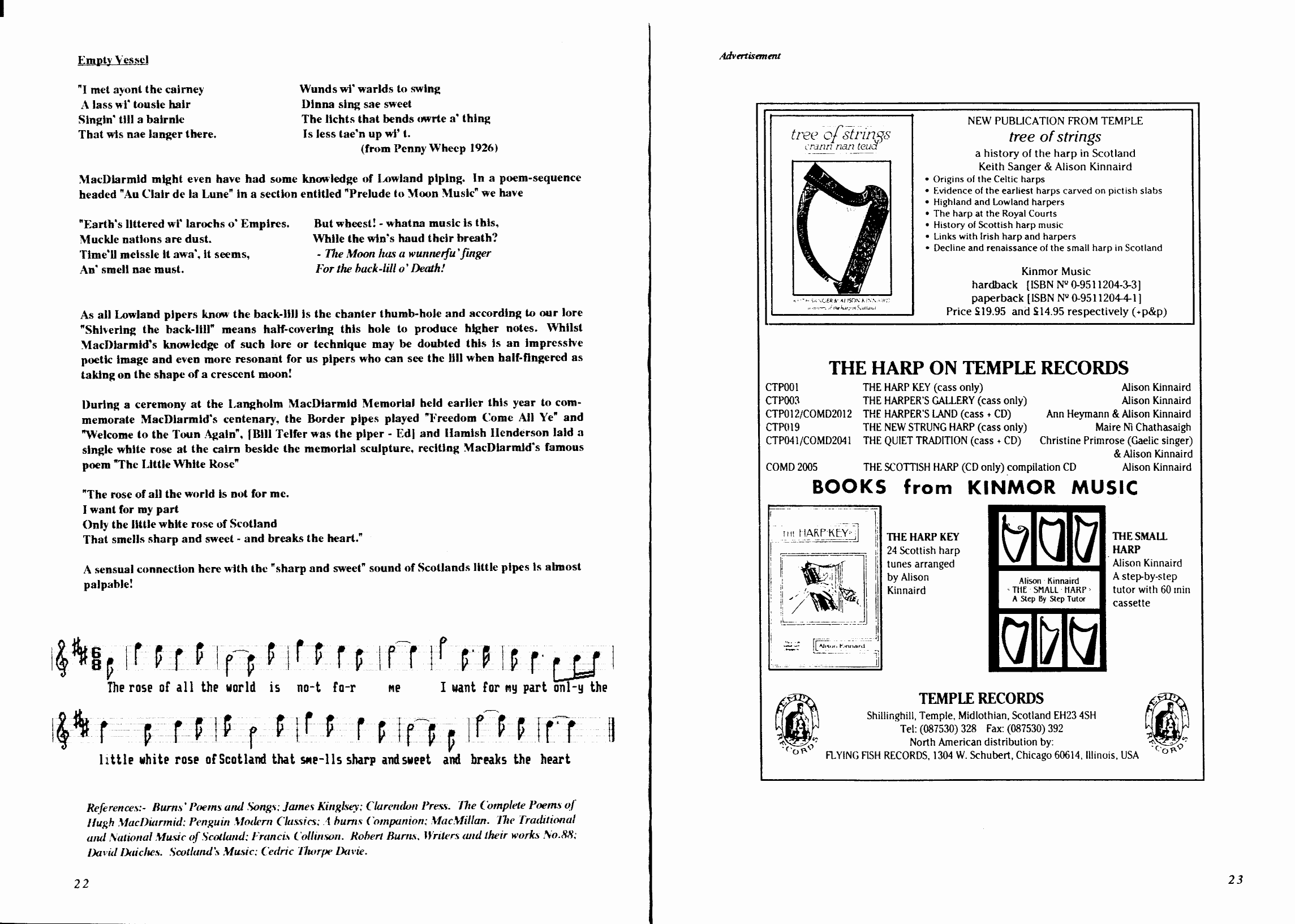Some Thoughts Of A Piper Anent Burns And MacDiarmid


Bill Telfer writes from Hong Kong to point out that the Scottish Poet Hugh MacDiarmid should not be forgotten when January 25th comes along. And he suggests that other enthusiasts put some of MacDiarmid’s lyrics to music suitable for the smallpipes - and offers his own composition based on the words of "The Little White Rose”
Whenever January 25th and Robert Burns’ anniversary approaches, the attitude of another great Scottish poet to Burns’ suppers is brought to mind
"Those vivid clots of idiot thoughts
Wherewith our Scottish life
Is once a year incomparably rife"
(from Hugh MacDiarmid's 1926 poem entitled “Your Immortal Memory, Burns!').
MacDiarmid expended considerable energy throughout his life in de-bunking the Burns
Cult, nowhere more effectively than in his masterpiece, "A Drunk Man Looks at the Thistle". For example,
"A they've to say was aften said afore,
A lad was born in Kyle to blaw aboot
What unco fate makes him the dumpin’ grun’
For a’ the sloppy rubbish they jaw aboot?”
Yet, It must he added, MacDiarmid was not averse to speaking at Burns Suppers whenever asked.
Pipers’ traditional involvement in Burns Suppers had centred on the ritual piping-in of the haggis and many of us no doubt have gone along happily enough, for a chance to play in public, a free dinner (or even as a paying gig). But I venture to suggest that the developing Lowland and Border piping revival can contribute to a growing scepticism about the relevance of participating as a kilted highland piper at this kind of event.
Thanks to the work of this Society and to the researches of Gordon Mooney and others, the taking up of the “cauld wind” pipes usually goes hand in hand with learning to appreciate something of their history and lore. From this we discover that the instrument seems to have had its heyday in the late 18th century, i.e. precisely during the lifetime of Robert Burns (1759 - 1796). It is not a big step from there to an awareness that not only did Burns never wear the kilt, but that he was more likely to have been familiar with Lowland than Highland pipes. One obvious justification for such a view might be that the towns he was most closely associated with - Ayr, Kilmarnock, Edinburgh. Dumfries, may have had (the latter two I know did have) Town Pipers, who probably played Lowland pipes.
After taking up small pipes. I certainly discovered there was more satisfaction to be derived from accompanying the singer of a Burns song, than parading in front of a haggis! Any suggestion, however, to the Chairman of a Burns Supper that I might be valid to pipe in the haggis unkilted, playing Border pipes, will tend to be regarded as little short of seditious. Of course my frame of reference is the Burns Supper of the tartan-waving diaspora, which seems to be more about crude assertions of national identity than about trying to do justice to Scotland‘s literary or musical heritage. (This is the kind of "do" from which some guests might come away with the impression that Burns was not so much an 18th century poet, as some kind of cross between Rob Roy McGregor and Harry Lauder, and which eventually decided me on total abstention from them - “retired hurt", you could say.) At home in Scotland you may be privileged with less cringe-making Burns Nights - at least I would hope so if run by the LBPS!
Burns suppers completely fail to convey any sense of Burns’ revolutionary republicanism - inevitable in McDiarmid's view because Burns was opposed to everything his adulators stand for
“And gin there was his like alive the day
They'd be the last a kennin’ hand to gi'e.”
His work as folklorist, tune and song collector is another much neglected side of Burns. For many of us Burns’ songs are associated with "awfully nice" sopranos, or kilted tenors, the drawing room rather than the folk tradition. In fact, for the last few years of his life Burns set himself the task of rescuing Scotland’s rural folk heritage - or "as much of it as he could lay hands on", in the words of Cedric Thorpe Davie. (See Jim Gilchrist’s article on page 6 of this issue).
Quite a few of the tunes Burns used are in the LBPS Tutor and Gordon Mooney’s other collections. They are tunes which we now regard simply as part of the Lowland and Border piping repertoire. This is a telling illustration of how the tradition is being replenished and renewed and at the same time a most fitting commemoration of Burns’ selfless labours in this field.
As for Hugh MacDiarmid, the greatest Scottish poet since Burns, he died in 1978, when the Border piping revival was still in its infancy. But there can be little doubt he would have welcomed and encouraged it. He celebrated (Highland) piping and Gaeldom often in his poetry. for example in the long, meditative poem "Lament for the Great Music", and he was in turn saluted by the piping fraternity. A piobaireachd was composed in his honour, the "Lament for the Children" played at his funeral. Yet he repeatedly emphasised he was a
Borderer through and through, always returning to his birthplace, Langholm, as his “touchstone in all creative matters”. His evocation of the Town Minstrel tradition, which to this day permeates the Langholm Common Riding celebrations is vivid and memorable
"Drums in the Walligate, pipes in the air,
Come and hear the cryin’ o’ the Fair.
A’ as it used to be, when was a loon
On Common-Ridin’ Day in the Muckle Toon".
Joy Hendry writing a newspaper review of a radio programme about the Lowland piping revival seems literally to have scented a connection,”. . like (he candym plant so beloved of MacDiarmid, the sweet-sounding Scottish smallpipes have popped up again and are rapidly taking root.” It is easy to imagine some of MacDiarmid’s poems set to the smallpipes - particularly the early lyrics with their Border ballad echoes.
Empty Vessel
"I met ayont the cairney
A lass wi" tousie hair
Singin’ till a bairnie
That wis nae langer there.
Wunds wi’ warlds to swing
Dinna sing sae sweet
The lichts that bends owrte a’ thing
Is less tae’n up wi’ t.
(from Penny Wheep 1926)
MacDiarmid might even have had some knowledge of Lowland piping. In a poem-sequence headed "Au Clair de la Lune” in a section entitled "Prelude to Moon Music" we have
"Earth's littered wi’ larochs o’ Empires.
Muckle nations are dust.
Time'll meissle it awa’, it seems, -
An’ smell nae must.
But wheest! - whatna music is this,
While the win's haud their breath?
The Moon has a wunnerfu' finger
For the back-lill o’ Death!
As all Lowland pipers know the back-lill is the chanter thumb-hole and according to our lore "Shivering the back-lill” means half-covering this hole to produce higher notes. Whilst MacDiarmid’s knowledge of such lore or technique may be doubted this is an impressive poetic image and even more resonant for us pipers who can see the lilt when half-fingered as taking on the shape of a crescent moon!
During a ceremony at the Langholm MacDiarmid Memortial held earlier this year to commemorate MacDiarmid's centenary, the Border pipes played "Freedom Come All Ye" and "Welcome to the Toun Again’, [Bill Telfer was the piper - Ed] and Hamish Henderson laid a single white rose at the cairn beside the memorial sculpture, reciting MacDiarmid’s famous poem "The Little White Rose”.
"The rose of all the world is not for me.
I want for my part
Only the little white rose of Scotland
That smells sharp and sweet - and breaks the heart.”
A sensual connection here with the "sharp and sweet" sound of Scotland’s little pipes is almost palpable!

References:-
Burns’ Poems and Songs; James Kinglsey;
Clarendon Press. The Complete Poems of Hugh MacDiarmid:
Penguin Modern Classics: A Burns Companion;
MacMillan. The Traditional and National Music of Scotland:
Francis Collinson. Robert Burns, Writers and their works No.88: David Daiches, Scotland's Music: Cedric Thorpe Davie.
